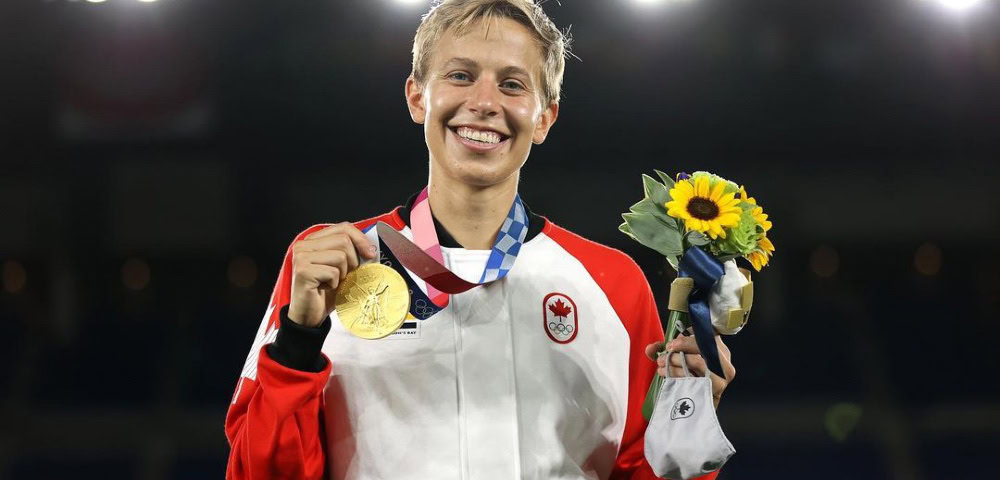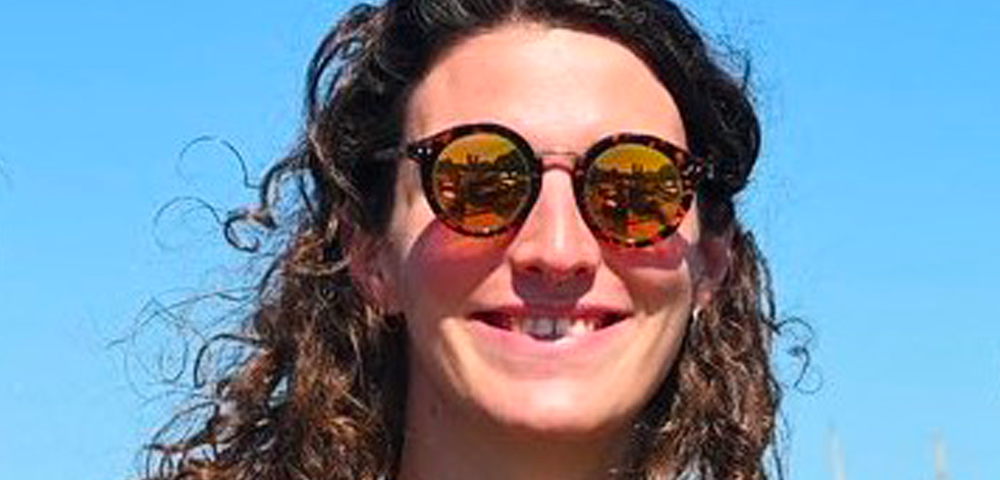
Quinn Becomes First Out Trans Olympic Medallist With Gold In Tokyo

For the first time ever in the history of the Olympic Games, Quinn, an out transgender and non-binary athlete, has won a gold medal. Quinn has become the only such athlete to ever take home any medal in the Games.
Quinn, 25, was part of the Canadian women’s football team, that beat Sweden 3-2 in the women’s football final to take gold on Friday night.
Quinn, a midfielder, was also part of the bronze medal winning Canadian team at the 2016 Rio Olympics. However, they only came out as transgender and non-binary in 2020.
“Olympic Champions! Did that really just happen?!?” Quinn said on Instagram while posting a photo with the gold medal.
View this post on Instagram
Quinn, had in July reflected on the significance of an out trans person competing in the Olympic Games.
“First openly trans Olympian to compete. I don’t know how to feel. I feel proud seeing ‘Quinn’ up on the lineup and on my accreditation. I feel sad knowing there were Olympians before me unable to live their truth because of the world. I feel optimistic for change. Change in legislature. Changes in rules, structures, and mindsets. Mostly I feel aware of the realities. Trans girls being banned from sports. Trans women facing discrimination and bias while trying to pursue their Olympic dreams. The fight isn’t close to over…and I’ll celebrate when we’re all here,” Quinn posted on Instagram.
In another post, Quinn thanked their teammates saying, “This team is hard to put into words! They have embraced change and turned uncomfortable conversations and I love them for it.”
View this post on Instagram
Quinn also acknowledged how challenging it has been to be out as transgender and non-binary. “Coming out is HARD (and kinda bs). I know for me it’s something I’ll be doing over and over again for the rest of my life,” they said on Instagram.
Trans Athletes Script History At Tokyo Olympics

The Tokyo Olympics are the first in Olympic history in which transgender athletes have competed. Until 2004, transgender athletes were banned from Olympic Games competitions.
Laurel Hubbard, 43, was the second transgender athlete competing in Tokyo. Hubbard, represented New Zealand in women’s +87kg weightlifting. She failed on all her snatch lifts and was eliminated before the clean and jerk portion of the competition, ultimately finishing at bottom of the standings.
Hubbard has since announced her retirement, telling reporters at a press conference, “Age has caught up with me. In fact, if we’re being honest it probably caught up with me some time ago. My involvement in sport is probably due, if nothing else, to heroic amounts of anti-inflammatories, and it’s probably time for me to start thinking about hanging up the boots and concentrating on other things in my life.”
Hubbard, who is soft-spoken and well-known to be reticent and press-shy, gave an eloquent statement to reporters. “I’m not sure that a role model is something I could ever aspire to be,” said Hubbard. “Instead I hope that just by being here I can provide some sense of encouragement.”
Anti-Trans Hate
“While I recognize that my involvement in sport is a topic of considerable interest to some. In some ways I am looking forward to this being the end of my journey as an athlete and the attention that comes from it. I have tried not to dwell on negative coverage or negative perception because it makes a hard job even harder. It’s hard enough lifting a barbell but if you’re putting more weight on it, it just makes it an impossible task really,” she said.
Hubbard’s entrance into the Olympic competition was met with a deluge of hate and criticism from some competitors and commentators. Anna Van Bellinghen, a Belgian weightlifter, in a statement had called the decision to allow Hubbard to compete “a bad joke.”
A petition against Hubbards’ inclusion as a competitor in her Olympic event garnered 30,000 signatures before it was taken down, with Change.org labelling it as “hate speech.”
“All I’ve ever wanted to be is myself. I’m just so grateful that I’ve had the opportunity to come here and be me,” Hubbard told reporters. Hubbard, who transitioned at the age of 35, competed internationally for the first time in 2017.
Rules Around Participation of Trans Athletes To Be Reviewed
Dr Richard Budgett, the International Olympic Committee’s medical and science director, said in a statement, “There are no IOC rules or regulations around transgender participation. That depends on each international federation…Laurel Hubbard is a woman…competing under the rules of her federation and we have to pay tribute to her courage and tenacity in actually competing and qualifying for the Games.”
In 2015, the IOC approved a set of guidelines for sports organisations when determining who is eligible to compete in male and female competitions. These guidelines allow for athletes transitioning from female to male to compete without restriction.
The IOC stated athletes who transition from male to female, must have “declared her gender identity is female and that declaration cannot be changed, for sporting purposes for a minimum of four years.” Prior to 2015 transgender athletes had to have undertaken gender reassignment surgery, a requirement which was ruled to be in contradiction of human rights.
Under current regulations athletes must show their total testosterone level is below 10 nanomoles per litre for at least 12 months prior to their first competition and remain at that level throughout the competition.
These guidelines are expected to face a review by the IOC following the completion of the 2020 Olympic Games.
For 24 hour crisis support and suicide prevention call Lifeline on 13 11 14
For Australia-wide LGBTQI peer support call QLife on 1800 184 527 or webchat.









